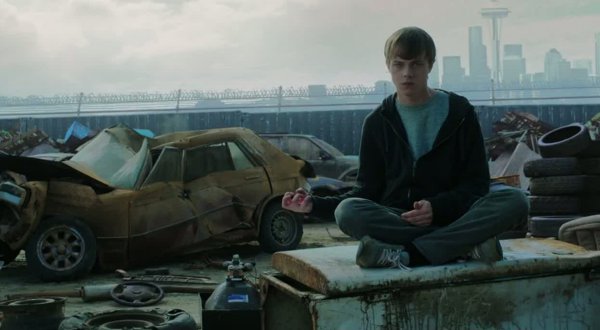by Scott Wold

If Peter Parker hadn’t grown up in the loving care of his Uncle Ben and Aunt May, ingrained with portentous advice about great power being inconveniently saddled with great responsibility, we might have seen a very different origin of Spider-Man. In Chronicle, director Josh Trank combines this very conceit with the now-practically-a-genre-of-its-own “found footage” gimmick. What on paper sounds like hoary contrivance, actually avails itself surprisingly well in viewing.
The “found footage” in question, meant initially to document his lecherous father (an excellently miserable Michael Kelley) in the act of domestic abuse, becomes beleaguered teen Andrew’s (Dane DeHaan) filter of choice for helping him cope with the bullying and other vagaries he’s surrounded by both at home and school. When his cousin, Matt (Alex Russelll), and friend, Steve (Michael B. Jordan), discover a mysterious hole, they bring Andrew and his camera along, only to encounter an unexplained source of power that conveniently shorts out the camera. The action picks up weeks later (with a new camera) after the boys begin noticing their emerging telekinetic abilities. Max Landis’s (the son of Blues Brothers and An American Werewolf in London helmer, John Landis) screenplay has a lot of fun showing us the boys’ bonding over learning to master their newfound talents, and really nails the patter and rhythm of the way teenage boys speak and behave. It’s easy to get caught up in the exuberant but (mostly) harmless mischief on display in the first and second act, especially as Andrew realizes he no longer need limit his video feed with strictly terrestrial concerns.
But it doesn’t all work. The introduction of a second camera shows the filmmakers’ hand a bit too obviously as we follow Matt’s awkward wooing of his crush, Casey (Ashley Hinsaw), and readily offers up the escape hatch needed when the rising menace of the third act is revealed. Following this near breach of the fourth wall—and in the hallowed tradition of both comic book and teenager tales—friendships and loyalties are abruptly tested and/or broken as that whole great power/great responsibility bond is tested. At 83 minutes, Chronicle feels a bit rushed, though some of that comes in the service of speeding to a grand super-showdown. And what a showdown! Trank whips the limitation of the delivery format into a frenzy of footage feeds that vastly scales up the overall scope of the film, safely and effectively allowing a more massive action set piece across the city of Seattle. (Think Akira on a more human level.)
Mostly, though, it’s great to think that we’ll be remembering Chronicle as “Josh Trank’s directorial debut.” Successfully navigating well-worn tropes is impressive, but goosing them back to life? That’s downright super.
Film Review: Chronicle
by Scott Wold
If Peter Parker hadn’t grown up in the loving care of his Uncle Ben and Aunt May, ingrained with portentous advice about great power being inconveniently saddled with great responsibility, we might have seen a very different origin of Spider-Man. In Chronicle, director Josh Trank combines this very conceit with the now-practically-a-genre-of-its-own “found footage” gimmick. What on paper sounds like hoary contrivance, actually avails itself surprisingly well in viewing.
The “found footage” in question, meant initially to document his lecherous father (an excellently miserable Michael Kelley) in the act of domestic abuse, becomes beleaguered teen Andrew’s (Dane DeHaan) filter of choice for helping him cope with the bullying and other vagaries he’s surrounded by both at home and school. When his cousin, Matt (Alex Russelll), and friend, Steve (Michael B. Jordan), discover a mysterious hole, they bring Andrew and his camera along, only to encounter an unexplained source of power that conveniently shorts out the camera. The action picks up weeks later (with a new camera) after the boys begin noticing their emerging telekinetic abilities. Max Landis’s (the son of Blues Brothers and An American Werewolf in London helmer, John Landis) screenplay has a lot of fun showing us the boys’ bonding over learning to master their newfound talents, and really nails the patter and rhythm of the way teenage boys speak and behave. It’s easy to get caught up in the exuberant but (mostly) harmless mischief on display in the first and second act, especially as Andrew realizes he no longer need limit his video feed with strictly terrestrial concerns.
But it doesn’t all work. The introduction of a second camera shows the filmmakers’ hand a bit too obviously as we follow Matt’s awkward wooing of his crush, Casey (Ashley Hinsaw), and readily offers up the escape hatch needed when the rising menace of the third act is revealed. Following this near breach of the fourth wall—and in the hallowed tradition of both comic book and teenager tales—friendships and loyalties are abruptly tested and/or broken as that whole great power/great responsibility bond is tested. At 83 minutes, Chronicle feels a bit rushed, though some of that comes in the service of speeding to a grand super-showdown. And what a showdown! Trank whips the limitation of the delivery format into a frenzy of footage feeds that vastly scales up the overall scope of the film, safely and effectively allowing a more massive action set piece across the city of Seattle. (Think Akira on a more human level.)
Mostly, though, it’s great to think that we’ll be remembering Chronicle as “Josh Trank’s directorial debut.” Successfully navigating well-worn tropes is impressive, but goosing them back to life? That’s downright super.